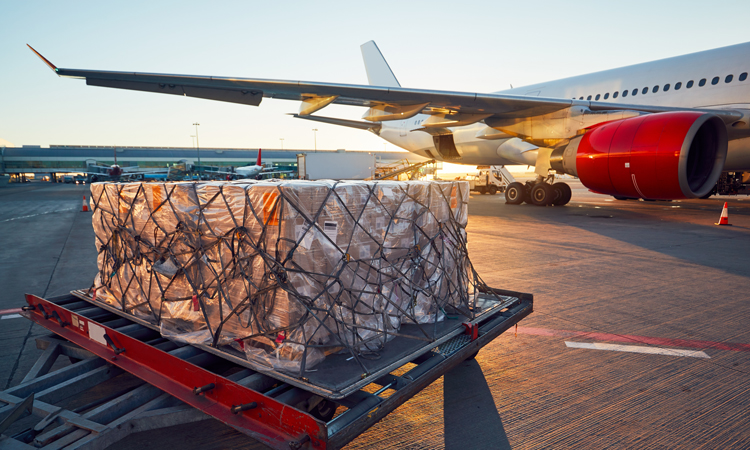How is the air cargo industry reacting and responding to the COVID-19 pandemic?
- Like
- Digg
- Del
- Tumblr
- VKontakte
- Buffer
- Love This
- Odnoklassniki
- Meneame
- Blogger
- Amazon
- Yahoo Mail
- Gmail
- AOL
- Newsvine
- HackerNews
- Evernote
- MySpace
- Mail.ru
- Viadeo
- Line
- Comments
- Yummly
- SMS
- Viber
- Telegram
- Subscribe
- Skype
- Facebook Messenger
- Kakao
- LiveJournal
- Yammer
- Edgar
- Fintel
- Mix
- Instapaper
- Copy Link
Posted: 1 May 2020 | Vladimir Zubkov - TIACA | No comments yet
In this exclusive Q&A with International Airport Review, Vladimir Zubkov, Secretary General of The International Air Cargo Association (TIACA), discusses the COVID-19 pandemic and its impact on the global air cargo industry.


What financial impact has COVID-19 had on the air cargo industry?
Data on the economic impact of COVID-19 on air transport has been obtained from different sources; from Veritas Global, Seabury, certain TIACA members and our new partner CLIVE. It has been used internally, and some has been shared with our partners during the multi-organisation meetings. Alongside this, the International Civil Aviation Organization (ICAO) has produced its study, which is updated on a weekly basis and shared with TIACA and other partners.
However, most of the estimates do not include potential impacts on the international air freight movements on cargo-only aircraft because of the lack of reliable data. What stands out is one of the recent assessments from Seabury:
- Global air cargo capacity is down by 35 per cent
- Only 20 per cent of belly cargo is still flying
- Freighters capacity has been stable for the last four weeks.
Airports are of course feeling the impact as well, as they are a very significant part of the entire mechanism enabling air cargo. Even during the full closure of airports to passenger traffic, a substantial share of airport and airside infrastructure remains open, which means that the overall cost base for operations remains almost the same, as most airports costs are fixed.
If we go further and examine the situation with ground handling, trucking and logistics companies, we will find many impediments for normal functioning. They are often fighting to keep domestic land transport lanes to and from the airport open, both to freight and staff. Otherwise we are just creating bottlenecks at the airport warehouses with air freight that cannot be distributed locally or, vice versa, picked up and shipped by air cargo.
How is TIACA supporting the industry, and why is this important?
The organisation is focused on reaching out to governments and reminding them that air cargo is a significant contributor to the global economy
TIACA sees its role to permanently promote the air cargo industry. The organisation is focused on reaching out to governments and reminding them that air cargo is a significant contributor to the global economy and international trade, and that it plays a very important role in preventing and battling the disastrous effect of coronavirus. The value of air cargo to airlines, governments, shippers and consignees has become more evident in the response to the COVID-19 crisis.
We should expect that the demand for medical supplies due to global sourcing will continue for the foreseeable future. It’s very important that the last-mile delivery services keep up with the demand for critical medical and food shipments during COVID-19.
How have cargo operations changed as a result of coronavirus?
The impact on the worldwide air cargo logistics industry is significant and will affect the industry’s ability to recover from COVID-19
The impact on the worldwide air cargo logistics industry is significant and will affect the industry’s ability to recover from COVID-19. Utilisation of passenger aircraft, expanded use of the charter flights, demands on the flexibility in bi-lateral and multi-lateral regulations, new standards for operations, protection of personnel: We are witnessing new procedures and logistics arrangements almost every day. It’s a big task to collect information and even a bigger one to disseminate it to the right businesses for more uniformity and compatibility.
We are to continue studying the changes. There is an initiative in which TIACA participates for the creation of a ‘Working Document on a post‐COVID‐19 recovery path’. It started with the involvement of all aviation related international organisations, and the document will give comprehensive answers to what extent air cargo operations changed as a result of coronavirus. It also will propose possible recovery guidance (short-, medium- and long‐term) with respective influencing factors and foreseeable challenges associated.
In what way have the imposed travel restrictions and border closures impacted the movement of air cargo?
There are numerous other restrictions which prevent proper air cargo movement
The sudden removal of belly capacity has disrupted air cargo flows, but the sector is quickly adjusting and might soon return to the levels seen pre‐COVID-19 with a growing demand for cargo deliveries.
But it’s not only the travel restrictions – there are numerous other restrictions which prevent proper air cargo movement. This is what we brought to the attention of the international aviation community with a request for change:
- The existing structure of bi-lateral and multi-lateral agreements imposes restrictions for the delivery of emergency supplies – restrictions should be relaxed
- Airlines need to quickly change the geography of the flights – this should be facilitated
- Slots at airports remain a problem – recognition should be given to the importance of cargo operations
- The danger of flight crews to be placed in quarantine – prudent exceptions are needed for key workers
- Some countries do not allow the transit of certain goods through their territories –messages should be channelled through WCO.
What can governments do to facilitate the smoother flow of cargo amidst the COVID-19 outbreak?
We continue to drive the message: Facilitate access to the destinations where cargo flights are to operate, ease restrictions and liberalise traffic movement
We are grateful to many governments all over the world for taking resolute actions to fight the COVID-19 outbreak. However, at the same time, many functions which are supposed to serve the interests of cargo flow have been negatively affected. We addressed the regulations and brought it to the attention of the ICAO Council. We continue to drive the message: Facilitate access to the destinations where cargo flights are to operate, ease restrictions and liberalise traffic movement.
In addition, we coordinate with all aviation-related organisations within the ICAO-created ‘COVID-19 Group’: The International Air Transport Association (IATA), Airports Council International (ACI), Global Express Association (GEA), the World Customs Organization (WCO), the International Coordinating Council of Aerospace Industries Associations (ICCAIA), the World Health Organization (WHO) and Civil Air Navigation Services Organisation (CANSO). All of us want the governments to handle the emerging issues properly. Emphasis is on efficiency, recognition of aviation’s role and removing restrictions for operations, and we use the power of this alliance to influence the administrations. We also have resolved to design and develop recovery mechanisms and action plans towards stabilisation and expedited recovery from these economic hardships.
One very encouraging development: WCO has just announced that its Secretary General has launched dedicated resources for customs administrations fighting COVID-19. WCO has published a dedicated webpage to update members and the general public about WCO’s tools, instruments and recommendations, as well as a HS Classification reference document for COVID-19 medical supplies, among others. This is a very significant step for greater uniformity in requirements and coordinated action during these challenging times.
How can the industry adapt its crisis management procedure to prevent another pandemic affecting air cargo so greatly?
It is clear that we need to learn lessons from what we are currently experiencing, and we need to implement new procedures within our industry in order to prepare ourselves for potential crises in the future
First, we are to appeal to state administrations for concerted efforts and collaboration. The European Union (EU) is a good example.
Beyond regulations, it is clear that we need to learn lessons from what we are currently experiencing, and we need to implement new procedures within our industry in order to prepare ourselves for potential crises in the future. I’m thinking, in particular, of procedures involving employees and their health and safety. It is essential that the various companies that make up our sector – like other industries – are able to create emergency plans to anticipate this type of crisis. This will involve analysing and managing risks, training employees and implementing pre-established procedures for a quick response (stocking and supplying protective equipment, monitoring staff wellbeing, managing schedules, setting up internal arrangements with emergency teams, managing IT systems to optimise remote working and protecting personal data). For aviation in particular, greater importance needs to be placed on air cargo and on adapted procedures, for example, to maintain activity despite the decline in capacity (running charter flights and adapting aircraft to carry cargo when passenger flights are impossible).
I am convinced that there will be a number of changes to the way people work after this crisis, and that air cargo will be able to adapt its procedures. We have seen that stakeholders have been able to adapt quickly. Providing and sharing feedback will be essential as we emerge from the crisis so that all businesses can adapt emergency procedures to suit their own activities and better anticipate unprecedented situations, such as this.
Will the future of the air cargo industry be different as a result of this pandemic?
Air cargo will play a significant role in supporting the recovery of the global supply chain and the economy
One of the key tasks is to safeguard the functionality of the air cargo supply chain to the maximum extent possible. A presumably stable element in recovery scenarios, air cargo will play a significant role in supporting the recovery of the global supply chain and the economy. One important condition is the facilitation and flexibility of rules.
I previously mentioned the ‘Working Document on a post‐COVID‐19 recovery path’. Hopefully, it will make many interesting assumptions regarding the future and propose possible recovery guidance (short, medium and long‐term). I especially want us to jointly come to an understanding of respective influencing factors and foreseeable challenges.
Biography
Vladimir Zubkov was appointed as TIACA Secretary General in January 2017. He previously served as Chairman of TIACA’s Industry Affairs Committee and was on the Board of Directors from 2010 to 2016.
He was Vice President of Volga-Dnepr Group of companies from 2008 to 2016, managing relations with IACO, IATA, ACI, WCO, the UN and TIACA, and participating in bi-lateral and multi-lateral negotiations.
Zubkov began his career at Sheremetyevo International Airport, later working for Aeroflot as General Manager for the UK and Ireland, Denmark and Sweden, before moving to its Headquarters as Deputy Commercial Director and Director of International Finance and Accounting. He has worked for ICAO as Director of the Air Transport Bureau and Director of Planning and Global Coordination for 22 years.
Related topics
Aeronautical revenue, Air freight and cargo, Airport crisis management, Airside operations, COVID-19
Related organisations
Airports Council International (ACI World), Civil Air Navigation Services Organisation (CANSO), CLIVE, European Union (EU), Global Express Association (GEA), International Air Transport Association (IATA), International Civil Aviation Organization (ICAO), International Coordinating Council of Aerospace Industries Associations (ICCAIA), Seabury, The International Air Cargo Association (TIACA), Veritas Global, World Customs Organization (WCO), World Health Organization (WHO)


















